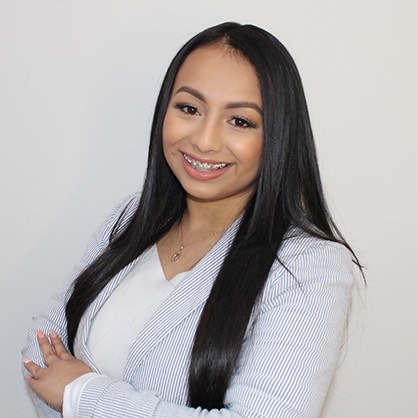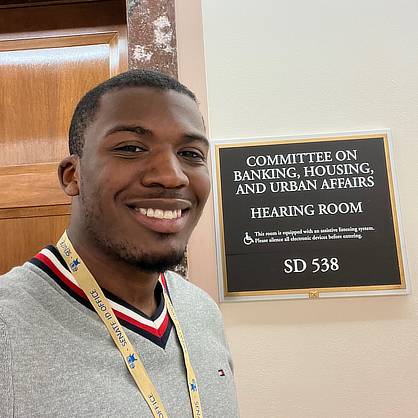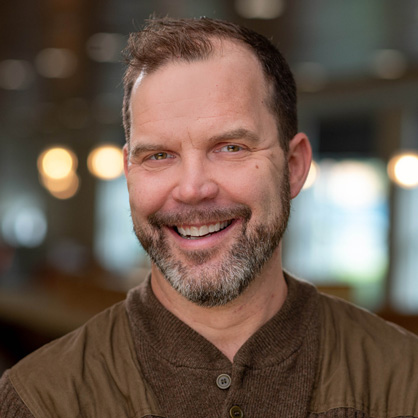
JASMIN GUEVARA '22
I Will Always Represent my Culture and Background
Governments, non-governmental organizations, businesses, and change agents – at the local, state, and national and international level – powerfully impact our lives.
As a political science major at the University of New Haven, you will develop an understanding of our complex political system and its players, and explore how and where you can make an impact.
Our faculty are leaders and innovators in their fields, bringing both deep professional experience and academic rigor to the classroom.

I Will Always Represent my Culture and Background

I now look at Black History Month as a time of both reflection and assessment.

The people I met at the University gave me the best four years of my life.
The information below is designed to show the many possible careers you could pursue with your major. The research is provided by Encoura, the leading research and advisory firm focused exclusively on higher education. It includes median national salaries and industry growth projections over the next decade. Click here to view the full report.
Operations and Policy Analyst
11% Growth 2017-2027
Manager of Legislation
11% Growth 2017-2027
Social Science Analyst
5% Growth 2017-2027
Students will take a comparative look at the sociological, psychological, political, religious, and economic forces that drive and confront migration in Europe and the United States. Moreover, students will explore and discuss the consequences of various policies and social responses in receiving areas and apply these insights to contemporary issues of migration. At the conclusion of the course, students will deliver a policy brief that provides a prescriptive response to one of these issues.
In the globalized world of the 21st century, divisions created by territorial boundaries are gradually fading with growing integration and inter-connectedness between different nation-states. In today’s world, states, which operate as isolated entities, run the risk of jeopardizing their own national interest. In the background of this development, the proposed course will provide students with a clear understanding of the emerging trends of globalization, what led to the beginning of these trends and what are its current patterns. The course will especially focus on the most recent "global flows" and their impact, including global economic flows as reflected in the growing international trade; global political flows as observed in the internationalization of political issues; global cultural flows as discerned through cultural convergences; and global technological flows as witnessed by the Internet revolution. In addition, the course will also explore and analyze the issues of terrorism, global warming and migration, as an outcome of the process of globalization.
Model United Nations is an experiential learning course that provides students with the simulated, real world experience of turning political ideas into reality. Students serve as country delegates to the United Nations tasked with researching, creating, formulating, negotiating, and arguing for solutions to some of the most pressing global issues/problems. This course will involve the creation of a position paper, participation in a prep conference, in class simulations, and potentially the MUN conference in Washington D.C. or Canada. At the conclusion of the course, students will produce a series of reports and reflection papers synthesizing their research and thoughts about their experiences and learning.
This course introduces students to American politics through an introduction to the seat of federal power itself, Washington, DC. In content, the course focuses on international relations with an emphasis on American foreign policy. But this is not a policy course; it is a politics course. Students will study a range of foreign and domestic policy decisions, some historical, most contemporary, and in doing so will emerge with a deeper understanding of how such decisions are made.
The University of New Haven offers a wide variety of in-depth courses that create a transformational educational experience for our students. To view the complete list of courses you'll take while pursuing a Bachelor of Arts in Political Science, check out the Academic Catalog:
Double Major - English and Political Science, B.A.
Double Major - International Affairs and Political Science, B.A.
Get an inside look at what differentiates the University of New Haven and how your experiences as a student will prepare you for success.




All University of New Haven students have access to the many resources available through the University’s Career Development Center, which has been named one of the best in the nation by The Princeton Review.
From career assessments, networking, and job shadowing to on-campus interviews and salary negotiation, the Career Development Center provides the skills and connections to identify a meaningful career and an opportunity to pursue your passion.
Learn More
In the Media
Matthew Schmidt, associate professor of international affairs, national security, and political science, comments that, militarily speaking, counting on your enemy to make a mistake in war is not a good strategy.
Whether you're still in high school or are transferring from another college, we offer full- and part-time opportunities for undergraduates from inside the U.S. and abroad. The admission process can begin as early as the end of your high school junior year.
The Application Process
We offer a comprehensive financial aid program, with students receiving assistance in the form of grants, scholarships, student loans, and part-time employment. Funds are available from federal and state governments, private sponsors, and from university resources. More than 85 percent of the University's full-time undergraduate students receive some form of financial assistance.
Learn More